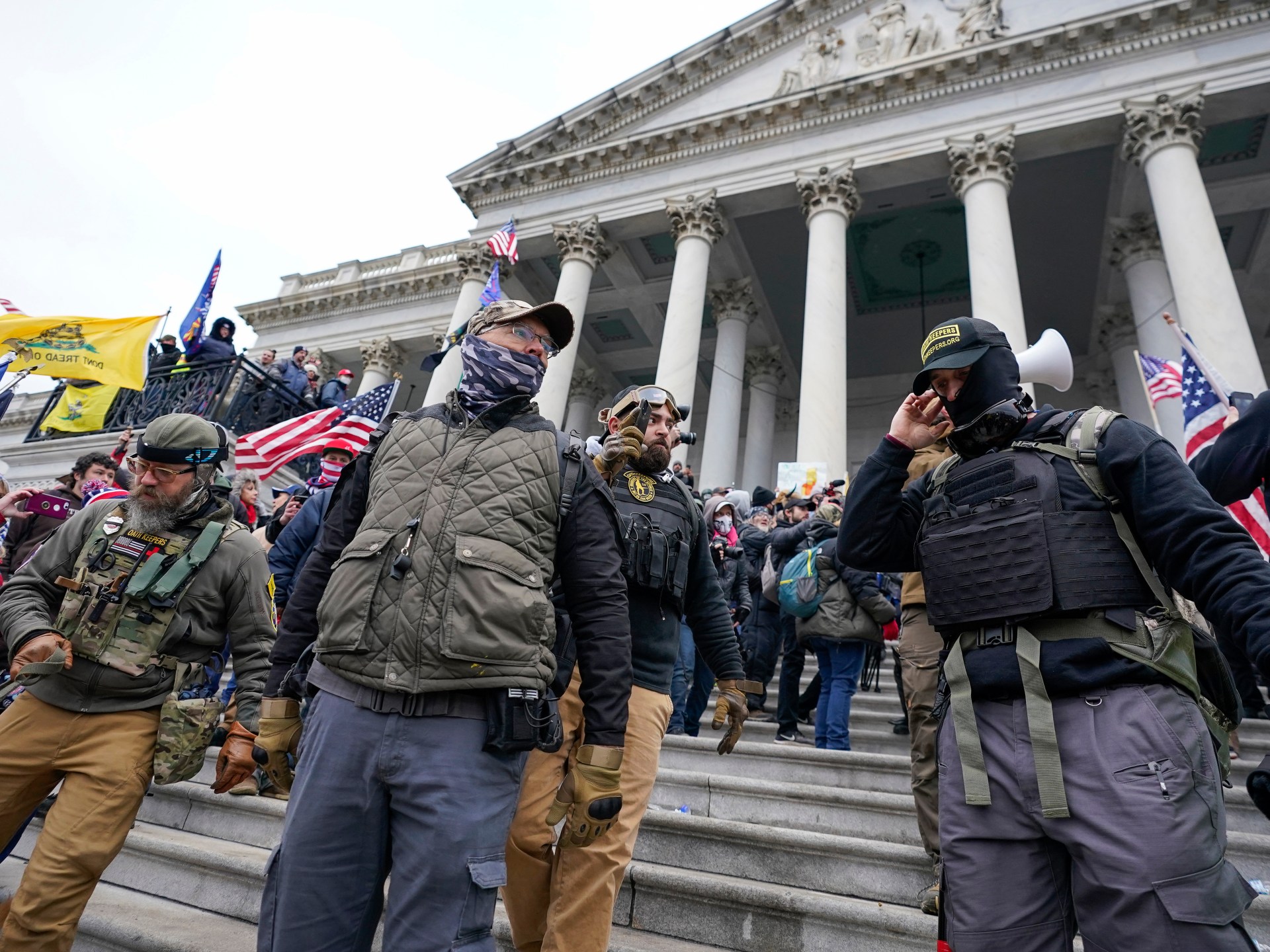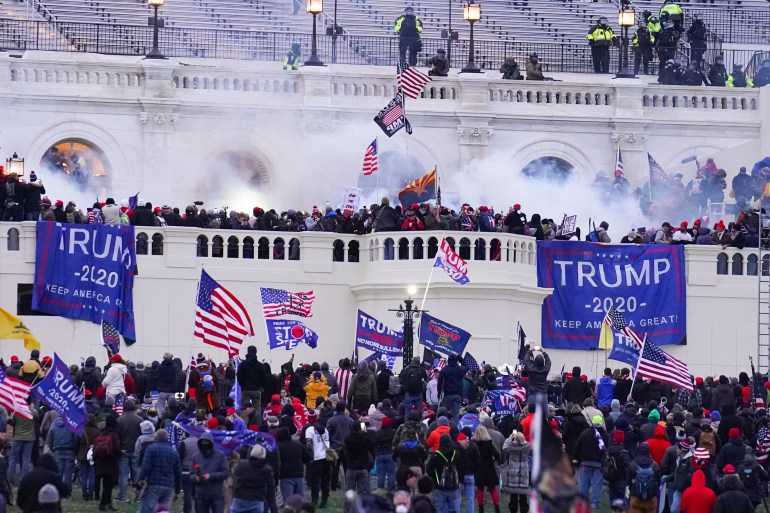
Broken glass. Clashes with the police. Angry protesters scale walls in front of the United States Capitol.
The images of the insurrection at the Capitol continue January 6, 2021remain among the most memorable in modern political history. That day, thousands of supporters of then-President Donald Trump stormed the building to overturn his election defeat, forcing lawmakers to flee to safety.
But three years later, the country is still struggling with the consequences. On Friday, the eve of the anniversary of the riots, current President Joe Biden, in a campaign speech near Valley Forge, Pennsylvania, condemned the violence and warned of its lasting impact on U.S. democracy.
“Three years ago tomorrow we saw with our own eyes the violent mob storming the United States Capitol,” he said. “For the first time in our history, insurgents had come to stop the peaceful transfer of power in America – the first time.”
Biden also took a swipe at Trump, accusing him of inaction and election-related lies. “It was one of the worst derelictions of duty by a president in American history.”
How the insurrection is viewed remains a bitter point of contention that largely divides the U.S. public along partisan lines. Trump has claimed that the 2020 election was “stolen” from him, a falsehood that helped fuel the insurrection at the Capitol.
This March, Trump is coming a federal indictment for his role in attempting to overturn the 2020 results. He is currently seeking a second term in the 2024 presidential race, as is Biden, the Democrat who defeated him in 2020.
In addition to the Trump case, long prison sentences continue to be imposed on participants in the Capitol riot. On Thursday, Christopher Worrell, a member of the far-right group Proud Boys, was sentenced to 10 years in prison for his role in the breach of the Capitol.
He joined other prominent far-right figures – including the former leader of the Proud Boys Enrique Tarrio And Stewart RhodesThe leader of the Oath Keepers militia faces ten years or more in prison.
On the third anniversary of the Capitol insurrection, here’s everything you need to know about how the insurrection continues to reverberate across the United States.
Trump case
In August, the former Republican president was indicted in a federal case Special Agent Jack Smitha former prosecutor hired to investigate his efforts to overturn the 2020 election results.
Trump faces four felony charges as part of this trial accusation: Conspiracy to defraud the United States, conspiracy to violate rights, conspiracy to obstruct an official proceeding and obstruction of an official proceeding.
U.S. prosecutors argued that Trump “attempted to exploit the violence and chaos at the Capitol by urging lawmakers to persuade them to delay certification” of the election results based on knowingly false claims of voter fraud.
Trump pleaded not guilty to the charges and denied any wrongdoing. The ex-president has also accused prosecutors of conducting a politically motivated “witch hunt” to derail his re-election in 2024.
The federal case is scheduled to begin March 4, a day before Super Tuesday, when more than a dozen states are expected to hold their primaries for the 2024 election.
Criminal charges
In early December, the Justice Department released its latest list of criminal charges related to the Jan. 6 riots, noting that more than 1,237 people had been charged.
Of these, more than 700 defendants pleaded guilty to various charges. About 450 were sentenced to prison.
To date, the most serious charge related to riots has been seditious conspiracy. A relatively rare Civil War-era charge. Seditious conspiracy is used to prosecute two or more defendants accused of plotting to overthrow the U.S. government, start a war against it, or obstruct its authority, including the implementation of its laws.
Seditious conspiracies are notoriously difficult to prosecute. Nevertheless, Rhodes and Tarrio were both convicted last year and received 18 and 22 years in prison respectively – the longest sentences to date.
On Thursday, U.S. Attorney Matthew Graves, in an address ahead of the Jan. 6 anniversary, described “scenes often reminiscent of a medieval battle” in which police were forced to engage in hand-to-hand combat with rioters armed with “dangerous weapons , including …”armed with firearms”.
“The siege of the Capitol is likely the largest single-day mass attack by law enforcement officers in our country’s history,” Graves said. He noted that the 140 reports of assaults among police officers likely represented an undercount.
Political polarization
Meanwhile, a significant percentage of Americans continue to believe the false claim that the 2020 election was stolen through widespread voter fraud — an idea promoted by Trump and his allies.
Critics say that belief helped motivate the thousands of rioters who attacked the Capitol on Jan. 6.
A recent study from the Washington Post-University of Maryland Survey found that 36 percent of respondents still “do not accept Biden’s victory as legitimate.”
Eight in 10 Trump voters and 72 percent of Republicans overall said they thought too much was made of the insurrection and it was “time to move on.” That’s in contrast to just 14 percent of Democrats, the poll found.
Respondents were also completely divided over whether Trump was guilty of conspiring to defraud the United States. The accusation was that he lied to illegally try to overturn the election.
While 56 percent of Americans overall said they believe Trump is “probably/definitely guilty” of the conspiracy charge, only 18 percent of Republicans agreed, compared to 88 percent of Democrats, the poll said.

Impact on the 2024 race
Trump is currently the leading candidate for the Republican nomination in the 2024 race and is well ahead of his party rivals. That means he is likely to run against Biden again in November, even though the four charges against him could complicate his campaign.
The Supreme Court is now in Colorado decided last month that Trump could no longer run for the White House, citing a section of the U.S. Constitution that prohibits people from holding office who have “participated in insurrection.”
Trump this week asked the U.S. Supreme Court to overturn the decision, which would mean he cannot run in the state’s Republican primary.
Both Trump and Biden have also referenced January 6 in their 2024 presidential campaigns, although to different effect.
Trump has promised to pardon convicted insurrectionists if re-elected, writing on social media last year: “Release the prisoners of January 6th. They were convicted or awaiting trial based on a huge lie.”
Biden, for his part, made sure of that Defending US democracy This was a key message of his re-election campaign, saying it was the “central issue” of his presidency. He called the January 6 insurrection an attack on those democratic ideals.
“Today we are here to answer the most important question: Is democracy still America’s sacred cause?” said the Democratic president during his speech on Friday in Pennsylvania.
“This is not rhetorical, academic or hypothetical. Whether democracy is still America’s sacred cause is the most pressing question of our time, and that is what the 2024 election is about.”







Recent Comments